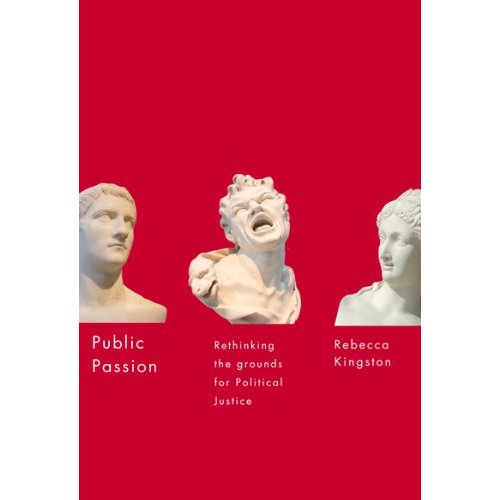Nouvelle publication
Rebecca Kingston, Public Passion : Rethinking the Grounds for Political Justice
Rebecca Kingston, Public Passion : Rethinking the Grounds for Political Justice, McGill-Queen’s University Press, 2011, 256 pages
ISBN-10 : 077353878X ; ISBN-13 : 978-0773538788

Whether in the reception of rousing political oratory like that of de
Gaulle or Martin Luther King or in the motivations of demonstrators in
popular uprisings like those in Tunisia and Egypt, there is no denying
that emotion and politics are connected. Nonetheless, criticism of
political debate and discourse as emotionally (rather than rationally)
based is ubiquitous and emotion is often presented as a negative factor in
politics.
Public Passion shows that reason and emotion are not mutually
exclusive and restores the legitimacy of shared emotion in political life.
Public Passion traces the role of emotion in political thought from its
prominence in classical sources, through its resuscitation by Montesquieu,
to the present moment.
Combining intellectual history, philosophy, and
political theory, Rebecca Kingston develops a sophisticated account of
collective emotion that demonstrates how popular sentiment is compatible
with debate, pluralism, and individual agency and shows how emotion shapes
the tone of interactions among citizens. She also analyzes the ways in
which emotions are shared and transmitted among citizens of a particular
regime, paying particular attention to the connection between political
institutions and the psychological dispositions that they foster.
Public Passion presents illuminating new ways to appreciate the forms of popular
will and reveals that emotional understanding by citizens may in fact be
the very basis through which a commitment to principles of justice can be
sustained.
Cet ouvrage approfondit la notion de principe chez Montesquieu, en le replaçant parmi les conditions psychologiques collectives de la politique, dans un vaste
contexte intellectuel et philosophique. Le dernier
chapitre s’efforce de dépasser l’analyse de Montesquieu en repensant les
fondements d’une théorie de la justice, théorie qui prendrait au sérieux les
émotions en politique, comme le fait aujourd’hui la pensée politique libérale.
La "lecture critique" de l’ouvrage Montesquieu and his Legacy, dirigé en 2008 par Rebecca Kingston (Suny Press) est désormais disponible :


